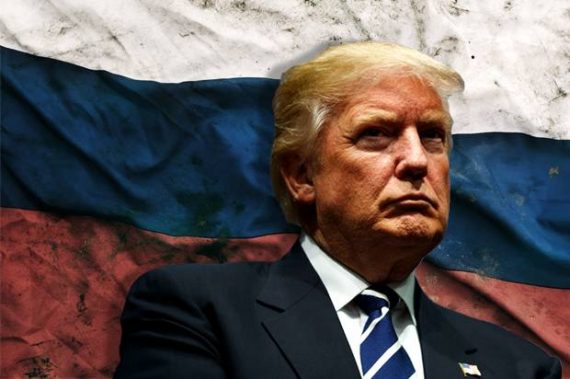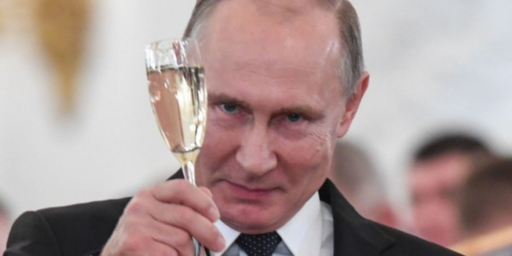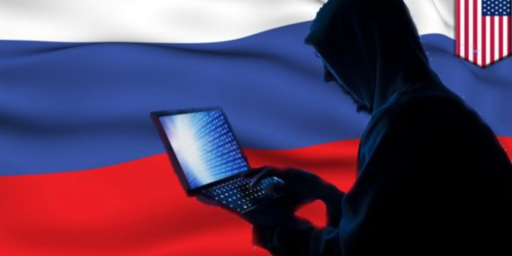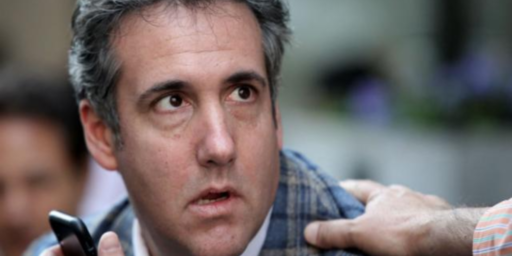Justice Department May Seek Charges Against Russian Officials For Election-Related Hacking
The Justice Department appears to be on the verge of charging Russian government officials in connection with election-related hacking.
The Wall Street Journal is reporting that Federal Prosecutors are considering charging specific Russian officials in connection with election-related hacking of the email of the Democratic National Committee and other sources during the course of the campaign:
Prosecutors and agents have assembled evidence to charge the Russian officials and could bring a case next year, these people said. Discussions about the case are in the early stages, they said.
If filed, the case would provide the clearest picture yet of the actors behind the DNC intrusion. U.S. intelligence agencies have attributed the attack to Russian intelligence services, but haven’t provided detailed information about how they concluded those services were responsible, or any details about the individuals allegedly involved.
The high-profile hack of the DNC’s computers played a central role in the U.S. intelligence community’s assessment in January that “Russian President Vladimir Putin ordered an influence campaign in 2016 aimed at the U.S. presidential election.” Mr. Putin and the Russian government have denied meddling in the U.S. election.
Thousands of the DNC’s emails and other data, as well as emails from the personal account of John Podesta, who served as campaign chairman to 2016 Democratic presidential nominee Hillary Clinton, were made public by WikiLeaks last year.
The pinpointing of particular Russian military and intelligence hackers highlights the exhaustive nature of the government’s probe. It also suggests the eagerness of some federal prosecutors and Federal Bureau of Investigation agents to file charges against those responsible, even if the result is naming the alleged perpetrators publicly and making it difficult for them to travel, rather than incarcerating them. Arresting Russian operatives is highly unlikely, people familiar with the probe said.
People familiar with the investigation drew the parallel to the Justice Department’s decision in March to charge two Russian operatives and two others with hacking into Yahoo’s computers starting in 2014 and pilfering information about 500 million accounts, one of the largest data breaches in U.S. history. One of the defendants in the Yahoo case, a Canadian national, was arrested and has pleaded not guilty; the other defendants are believed to be in Russia.
Last December, the Democratic administration of then-President Barack Obama imposed sanctions on Russia’s military-intelligence agency, which uses the acronym GRU, and Russia’s Federal Security Service, Russia’s equivalent to the Central Intelligence Agency, in response to the DNC and other hacks. It also named several individuals, including one who was later charged in the Yahoo case.
Federal prosecutors and federal agents working in Washington, Pittsburgh, San Francisco and Philadelphia have been collaborating on the DNC investigation. The inquiry is being conducted separately from Special Counsel Robert Mueller’s investigation of alleged Russian meddling in the 2016 election and any possible collusion by President Donald Trump’s associates.
(…)
A Justice Department spokesman and an FBI spokeswoman declined to comment on the identification of the Russian government officials allegedly behind the DNC hack. The Russian Embassy didn’t respond to a request for comment.
Mr. Trump has cast doubts on Russia’s role in the hack. In a series of tweets this past June, the president called the idea that Russia hacked the DNC a “big Dem HOAX.” He added that it was “a big Dem scam and excuse for losing the election!”
High-ranking U.S. intelligence and law-enforcement officials have consistently stood by the intelligence community’s January assessment.
In that document, the intelligence community said GRU, “probably began cyber operations aimed at the U.S. election by March 2016.” It said the GRU had exfiltrated “large volumes of data” from the DNC by May.
The Justice Department and FBI investigation into the DNC hack had been under way for nearly a year, by prosecutors and agents with cyber expertise, before Mr. Mueller was appointed in May. Rather than take over the relatively technical cyber investigation, Mr. Mueller and the Justice Department agreed that it would be better for the original prosecutors and agents to retain that aspect of the case, the people familiar with the Justice Department-FBI probe said.
It is unclear if prosecutors will hold back filing charges until Mr. Mueller completes his investigation or wait to identify others who may have played a role in the DNC hack. Investigators believe dozens of others may have played a role in the cyberattack, the people said.
Realistically speaking, of course, it’s unlikely that any such officials would ever be formally brought before an American court and put on trial due to the fact that the Russian government would never agree to surrender them to American officials, or to admit that they had backed an effort to break into American computer systems prior to the election. Potentially, though, such charges could place serious restrictions on the ability of these officials to travel outside of Russia since the pending charges would likely trigger an effort by the United States to have them extradited for trial pursuant to international law. In this respect, if brought the charges would be similar to those brought in 2014 against five members of a unit inside the Chinese army that is dedicated to hacking into computer systems around the world. In that case, the charges came in connection with the theft of corporate secrets from American companies rather than government systems or the systems of explicitly political organizations. None of those individuals have actually been brought to trial by the United States, but the charges remain pending at this time and could proceed to trial in the admittedly unlikely event that any of them were actually apprehended, The same would be true of these potential charges against Russian officials.
The fact that these charges is noteworthy not the least bit because it comes at the same time that the Trump Administration generally, and President Trump in particular, have taken the position that there is no substance to the entire Russia investigation and their insistence that the media should instead be paying attention to long-ago debunked charges against Hillary Clinton related to the sale of an interest in a Canadian company called Uranium One to a Russian corporation. That assertion has always been nonsense, of course, not the least because of the fact that seventeen separate American intelligence or law enforcement agencies have said that the Russians did in fact attempt to interfere with the Presidential election, and the evidence to support that conclusion continues to mount day after day. Bringing formal charges, though, would most certainly put the lie to the Trump Administration denials and efforts to deflect attention from the ongoing investigations.
To be fair, it should be noted that these charges would not appear to go to the issue of potential collusion between the Trump Administration and Russian officials or interests in connection with the election. That is something that is largely the subject of Robert Mueller’s investigation, and which plays a central role in the charges filed earlier this week, especially those against former Trump foreign policy adviser George Papadopoulos, who the Trump Administration has dismissed as a low-level volunteer but who was apparently in close contact with top-level officials in the Trump campaign regarding his contacts with Russia regarding the election. Nevertheless, these charges would, along with those brought by Mueller, bring the Russia investigation to an entirely new level and the charges filed against them could end up providing several important clues about where Mueller’s investigation is headed as well as shedding yet more light on exactly what Russia was up to last year and what impact it may have had on the election itself.







AG Sessions will say: Nyet….
It’s like they are just begging for another Saturday Night Massacre
What Russia was up to last year:
Sabotaging our politics so that we can spend the next 4-8 years debating Trump’s obsessions and the tweets he writes about them, adding another “lost” decade to the decades of stagnation we’ve already experienced.
@James Pearce: Here’s the thing, that’s not their end game. That division was going to happen regardless of who won.
Russia’s end game is that they wanted an easy-to-manipulate POTUS, preferably one with some serious financial obligations to the Russian mafia. Say what you will about her political skills, but those qualities were absolutely not available with Hillary Clinton.
@Tony W:
Maybe, but the risk/reward doesn’t make sense for some gangsters.
Russia has this weird thing where they think they’re superior to nearly every other country on earth but deep down, they know they’re not.
I’m not so sure this is the endgame so much as a bonus. I am spectacularly creeped out by even the moderate success the Russians saw in organizing protests via Facebook. This has a very, very sinister psychology tint to it. They can quickly throw gas on fires of small issues, making them bigger. Inciting violence isn’t too far behind.
This could lead to calls to regulate and/or clamp down on social networks, something that the Russians would be just fine with–it would allow them to further control and squash dissent in their own country. The election of 2016 could well be the first cyber-shot fired in a longer war on global free speech. That could embolden Putin to his real end, which is breaking up the cohesion in the West, and reestablishing control over countries and regions he’s still ticked about losing after the Cold War ended.
Re-reading the above, it sounds pretty paranoid, but I wouldn’t put anything past a former KGB officer.
So a major adversary attacks us, continues to attack us, and in response we file some charges against some low level people; charges that will never, ever, amount to a hill of beans.
Is this what the Fat Orange Blob was talking about when he says he is a big strong leader?
So much strength, I’m tired of all the strength.
The Russians correctly assessed the intelligence of the American voter and exploited it to elect a man they knew would be tractable.
The week’s opinion piece:
http://fallacyreporter.com/2017/11/02/stupid-or-sleazy-or-both/
@Tom Ersin: I had not ran across that news outlet before, but now I will take a look at it more. I cut loose the main stream news some time ago. Too much hollering at guests, at each other, slanted opinions, and the non-professional conduct. A far cry from what we grew up with: Conkrite, Brinkley, Kuralt.
Try NewsEla, USA Today, Popular Science, Channel One. These give facts, not a bunch of opinions.